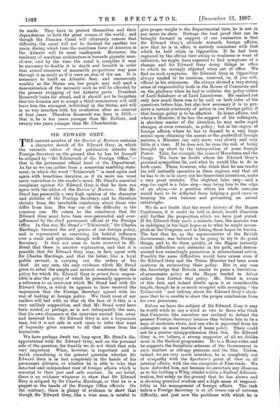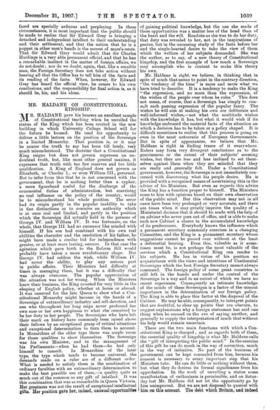SIR EDWARD GREY. T HE current number of the Review of
Reviews contains a character sketch of Sir Edward Grey, in which the versatile editor of that publication attacks the Foreign Secretary on the ground that he has let himself be eclipsed by " the Tchinovnik of the Foreign Office,"— that is, the permanent official head of the Department. As far as we can gather from a. somewhat rambling state- ment, in which the word "Tchinovnik " is used again and again with breathless iteration, as if its mere use must carry conviction to the reader's mind, Mr. Stead's essential complaint against Sir Edward Grey is that he does not agree with the editor of the Review of Reviews. But Mr. Stead has personally a very high opinion of the character and abilities of the Foreign Secretary, and he therefore shrinks from the inevitable conclusion about those who differ from him. His way out of the difficulty is the common one. He comes to the conclusion that Sir Edward Grey must have been over-persuaded and over- influenced by the chief permanent official at the Foreign Office. In this way Mr. Stead's " Tchinovnik," Sir Charles Hardinge, becomes the evil genius of our foreign policy, and is represented as exercising his baleful influence over a weak and spiritless, though well-meaning, Foreign Secretary. It does not seem to have occurred to Mr. Stead that there is another explanation, and that it is possible that Sir Edward Grey may, in fact, agree with Sir Charles Hardinge, and that the latter, like a loyal public servant, is carrying out the orders of his chief. At any rate, the only evidence which Mr. Stead gives to rebut the simple and natural conclusion that the policy for which Sir Edward Grey is privet facie respon- sible is also the policy of which he personally approves is a reference to an interview which Mr. Stead had with Sir Edward Grey, in which he appears to have received the impression that the Foreign Secretary agreed with his way of looking at foreign policy. We think most of our readers will feel with us that on the face of it this is a very unlikely supposition, and that Mr. Stead must have been misled, or perhaps, as is not infrequently the case, that his own eloquence at the interview carried him away and deceived him. Sir Edward Grey is not a loquacious man, but it is not safe in such cases to infer that want of loquacity gives consent to all that comes from the loquacious.
We have perhaps dwelt too long upon Mr. Stead's dis- appointment with Sir Edward Grey, and on the personal side of the question, for frankly we do not think that side very important. What, however, is important and is worth considering is the general question whether Sir Edward Grey is in fact completely in the hands of his permanent advisers, or whether he is able to take that detached and independent view of foreign affairs which is essential to their just and safe condnct. In our belief, there is no evidence whatever to show that Sir Edward Grey is eclipsed by Sir Charles Hardinge, or that he is a puppet in the hands of the Foreign Office officials. On the contrary, there is plenty of evidence to show that though Sir Edward Grey, like a wise man, is careful to give proper weight to the Departmental view, he is not in any sense its slave. Perhaps the best proof that can be brought forward in support of our contention is that Sir Edward Grey's attitude towards foreign affairs, now that he is in office, is entirely consistent with that which he held while in Opposition. If he had been captured by the official view owing to weakness or want of initiative, we might have expected to find symptoms of a change, and Sir Edward Grey doing things in office to which he strongly objected when out of office. We find no such symptoms. Sir Edward Grey in Opposition always tended to be cautious, reserved, or, if you will, official in his utterances. He always showed a very strong sense of responsibility both in the House of Commons and on the platform when he had to criticise the policy either of Lord Salisbury or of Lord Lansdowne. He realised not only how much there was to be said on both sides of the questions before him, but also how necessary it is to pre- serve a certain continuity of action in our foreign policy if that foreign policy is to be effective. In home affairs, and where a Minister, if he has the support of his colleagues, is absolute master of the situation, he may make rapid changes, or even reversals, in policy ; but in the region of foreign affairs, where he has to depend to a very large extent upon obtaining the assent or the goodwill of foreign nations, a Minister can only move very slowly and very little at a time. If he does not, he runs the risk of being brought up short by the interposition of some foreign Power. Take, for example, the cases of Macedonia and the Congo. We have no doubt where Sir Edward Grey's personal sympathies lie, and what he would like to do-in both cases. Those, however, who think that he can render his will instantly operative in these regions, and that all he has to do is to carry out his benevolent intentions, make a very great mistake. The slightest false step—and a step too rapid is a false step—may bring him to the edge of an abyss,—to a position where his whole energies would have to be deflected from helping a good cause to keeping his own balance and preventing an actual catastrophe.
We do not doubt that the secret history of the Hague Conference, if it could be told in detail, would illustrate still further the proposition which we have just stated. If Sir Edward Grey made a mistake here, the mistake was in indulging in too high hopes as to what he might accom- plish at the Congress, and in letting those hopes be known. The fact that he, as the representative of the British Government, was believed to be going to try to do great things, and to do them quickly, at the Hague instantly raised difficulties and obstacles in his path, and demon- strated how exceedingly precarious is international action. Possibly the same difficulties would have arisen even if Sir Edward Grey and the Prime Minister had been more cautious in enunciating their policy. But in any case the knowledge that Britain meant to press a limitation- of-armaments policy at the Hague tended to defeat rather than further that policy. Mr. Stead is aware of this fact, and indeed dwells upon it at considerable length, though he is so much occupied with scourging " the Tchinovnik " and talking about Sir Edward Grey's slack- ness that he is unable to draw the proper conclusions from his own premisses.
Before we leave the subject of Sir Edward Grey it may be worth while to say a word or two to those who think that Unionists like ourselves are inclined to defend the present Foreign Secretary because they believe him to be a man of moderate views, and one who is separated from his colleagues in most matters of home policy. There could not be a greater misapprehension than this. Sir Edward Grey is, we believe, a strong supporter of all we dislike most in the Radical programme. He is a Home-ruler, and he supports the Socialistic schemes of the Government in such matters as old-age pensions and the like. Unless, indeed, we are very much mistaken, he is completely out of sympathy with the Spectator's point of view on all internal affairs, with the one exception of Free-trade. We have defended him, not because we entertain any illusions as to his holding a Whig citadel within a Radical Adminis- tration, but solely on the ground that he has shown and is showing practical wisdom and a high sense of responsi- bility in ' his management of foreign affairs. The task before a Foreign Secretary is at all times one of extreme{ difficulty, and just now the problems with which he is faced are specially arduous and perplexing. In these circumstances, it is most important that the public should be made to realise that Sir Edward Grey is bringing a detached and independent intellect to their understanding and their settlement, and that the notion that he is a puppet in other men's hands is the merest of mare's-nests. That Sir Edward Grey would admit that Sir Charles Hardinge is a very able permanent official, and that he has a remarkable instinct in the matter of foreign affairs, we do not doubt; nor do we doubt, again, that, like a sensible man, the Foreign Secretary does not take action without bearing all that the Office has to tell him of the facts and its reading of the facts. When, however, Sir Edward Grey has heard the official view, he comes to his own conclusions, and the responsibility for final action is, as it should be, his, and his alone.















































 Previous page
Previous page